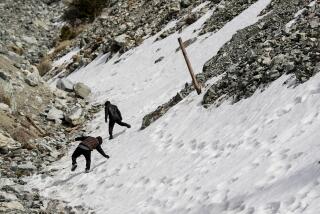National Parks Snowmobile Ban Wins Backing in Public Comments
- Share via
YELLOWSTONE NATIONAL PARK, Wyo. — Eighty-two percent of public comments on the park’s winter management plan favor a snowmobile ban, the National Park Service said Tuesday.
Conservation groups were buoyed by the results, which also covered Grand Teton National Park and the John D. Rockefeller Memorial Parkway. Nearly 8,500 people commented.
“The public is saying more clearly than ever, ‘We support the decision to phase out snowmobiles and protect Yellowstone,’ ” Greater Yellowstone Coalition spokesman Jon Catton said. “What also comes ringing through this public comment is that the snowmobile industry can force a new process through, and it has, but it can’t change public opinion.”
Ban advocates contend it is the fourth time public sentiment supported phasing out snowmobiles from the parks.
But Ed Klim, president of the International Snowmobile Manufacturers Assn., questioned the legitimacy of the result. He said Tuesday that environmentalists “knew the decision was going to be overridden, the initial one, and they were prepared to complain about it before it even happened.”
He said the industry hired an independent pollster, who found 86% of those responding favored allowing snowmobiles in the parks.
The Park Service decided last year to phase out snowmobiles over three winters, starting with a cap at the historical level this winter. Snowmobile access will be cut by half next winter and banned completely beginning in the winter of 2003-2004.
The association sued to void the decision. It settled when the Park Service agreed to reconsider the issue.
Environmentalists claim the snowmobile industry has provided little new information so far on cleaner and quieter machines that could reverse the earlier decision. Klim said the industry has shown that new snowmobile engine designs have 85% to 95% lower emissions.
However, a Park Service official said in August that the industry had presented only generalizations about potential reductions of noise and emissions, not laboratory studies that had been subject to review by independent scientists.
More to Read
Sign up for Essential California
The most important California stories and recommendations in your inbox every morning.
You may occasionally receive promotional content from the Los Angeles Times.










